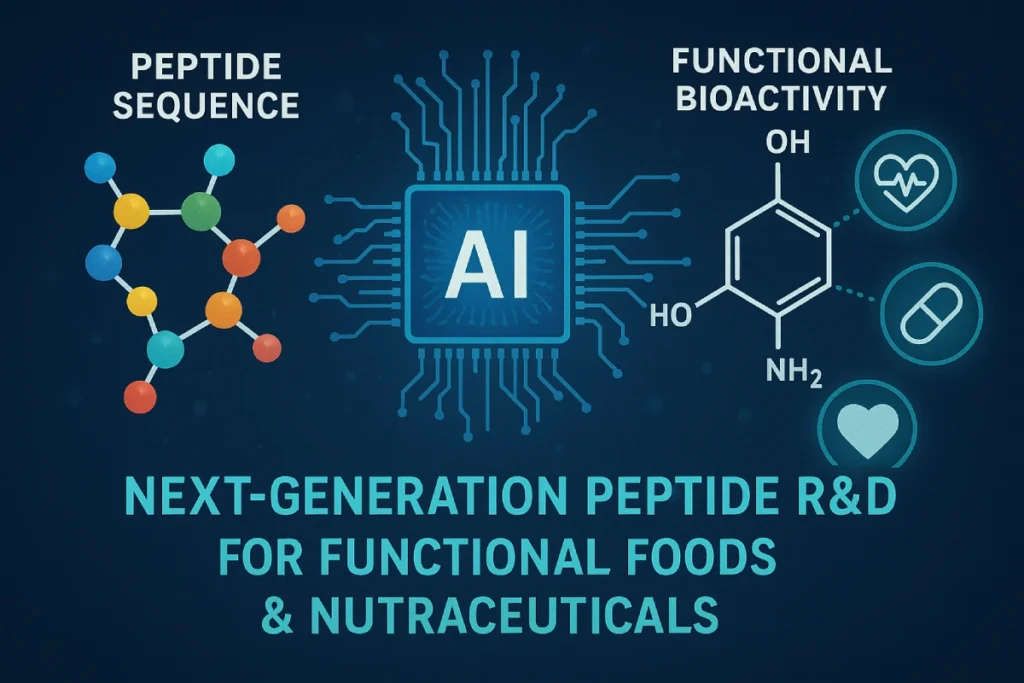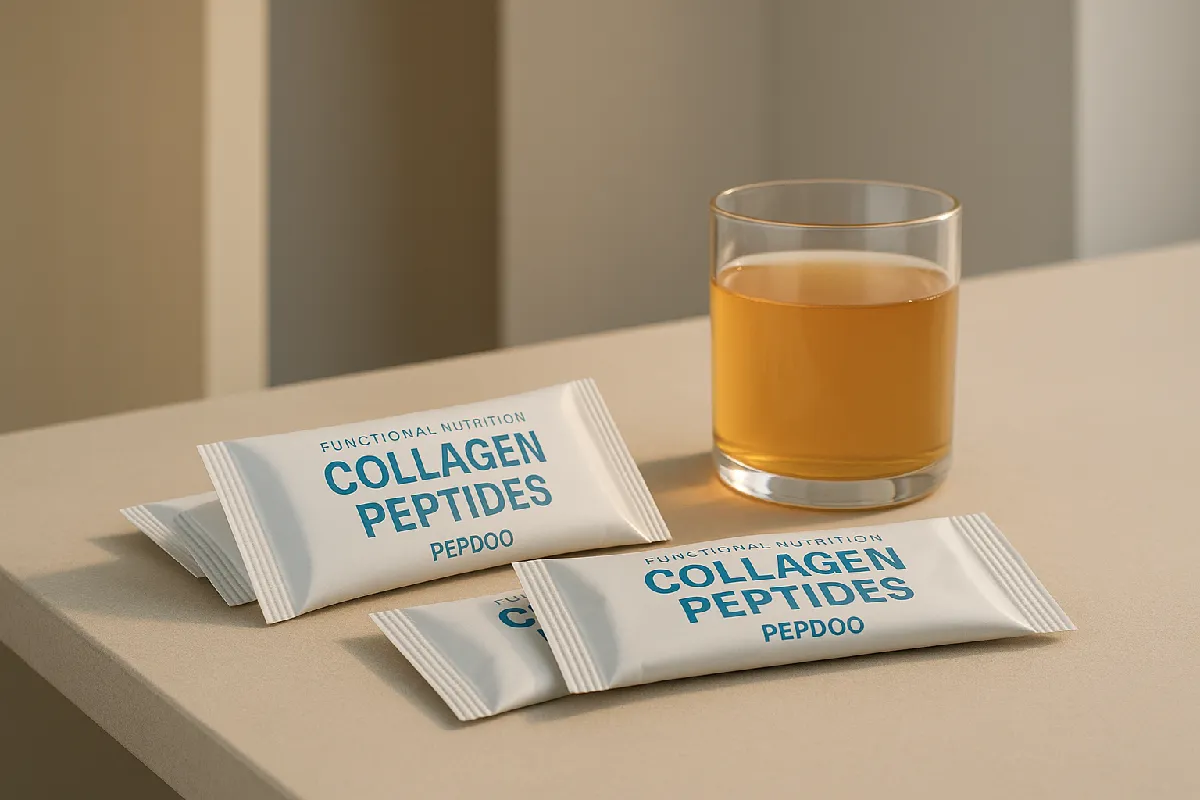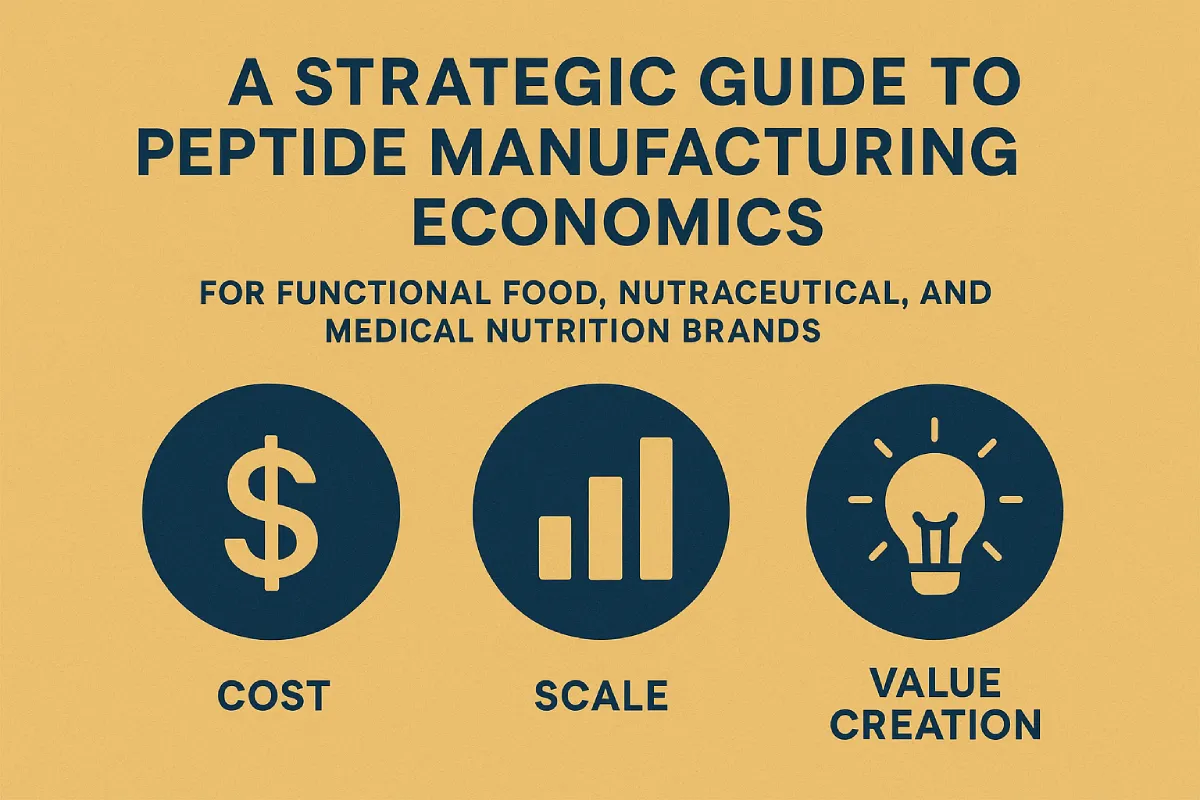Why Peptide Sequencing Matters for Functional Nutrition
In the rapidly evolving functional nutrition sector, bioactive peptides have become a cornerstone ingredient for functional foods, nutraceuticals, and medical nutrition products. Understanding peptide sequencing and peptide identification is critical for discovering new peptides, validating their functions, and accelerating commercialization. Companies like PEPDOO® have positioned themselves as full-range peptide manufacturers and industry standard setters in China, leveraging a portfolio of small molecule peptide patents and advanced peptide production technologies to support B2B clients in functional product development [1].

Understanding Peptide Sequencing and Its Impact on Functional Peptides
Peptide sequencing determines the exact order of amino acids, directly influencing biological activity and functionality. In functional foods and nutraceuticals, precise sequencing ensures efficacy in areas such as cardiovascular health, metabolic support, skin health, and joint function. For example, soy peptides have been sequenced to optimize their cardiovascular benefits, providing validated functionality for heart health formulations [2]. By leveraging advanced sequencing techniques, companies can align peptide discovery with commercial needs, ensuring high-impact results for B2B customers.
Advanced Technologies for Peptide Sequencing and Identification
Mass Spectrometry (MS) for Functional Peptides
MS/MS is widely used for sequencing small peptides due to its sensitivity and precision. For instance, oyster peptides used in men’s health supplements have been analyzed through mass spectrometry to identify active sequences that enhance libido and support metabolic function [3].
Next-Generation Sequencing (NGS) and Proteomics
NGS combined with proteomics allows researchers to explore peptide diversity from complex plant and marine sources. Marine fish collagen peptides have benefited from NGS-guided discovery, accelerating the development of sports nutrition products targeting joint and skin health [4].
AI and Bioinformatics Tools in Peptide Identification
Artificial intelligence and bioinformatics enable rapid prediction of peptide activity and structure-function relationships. Plant peptide blends used in glucose management products have been optimized through AI-driven sequence analysis, allowing for targeted functional outcomes [5]. PEPDOO® employs advanced AI-assisted peptide screening integrated with China’s leading international peptide production technologies to provide high-throughput, functionally validated peptides for B2B partners.
Challenges in Peptide Sequencing for Nutraceuticals and Functional Foods
The complexity of raw materials from plants, animals, and marine sources presents a challenge for peptide sequencing. High-throughput data, lengthy functional validation cycles, and production cost control are common obstacles. B2B clients in the nutraceutical industry face pressure to shorten the timeline from discovery to market-ready products. Partnering with a trusted manufacturer like PEPDOO®, which holds numerous small molecule peptide patents and serves as an industry standard setter, can streamline development and ensure regulatory compliance [1].
Emerging Trends and Future Directions in Peptide R&D
AI-Driven Peptide Discovery for Functional Nutrition
Machine learning accelerates functional peptide prediction and novel peptide discovery. Collagen tripeptides in beauty and joint health products have been optimized via AI-driven identification, reducing time-to-market and enhancing efficacy [6].
High-Throughput Screening of Functional Peptides
High-throughput screening enables large peptide libraries to be rapidly evaluated. Pea peptides for metabolic support have undergone rapid screening to identify potent sequences suitable for functional food and dietary supplement applications [7].
Precision Nutrition and Personalized Peptide Solutions
Integrating peptide sequencing with precision nutrition supports customized interventions. Specialized medical nutrition products targeting diabetic patients have utilized sequenced peptides to enhance metabolic management and glycemic control [8]. With PEPDOO®’s international production capabilities and patent-backed technologies, B2B clients can access tailored peptide solutions with validated functions.

From Peptide Sequencing to Commercialization: Industrial Translation
Translating sequencing insights into commercial products involves regulatory compliance, formulation optimization, and scalable production. For example, chicken gizzard peptides have successfully transitioned into anti-glycation and lipid metabolism functional foods, demonstrating market viability [9]. PEPDOO®’s integrated R&D-to-manufacturing approach supports B2B clients across functional food, nutraceutical, and medical nutrition sectors, ensuring high-quality peptide supply.
Why PEPDOO® is Your Partner for Next-Generation Peptide R&D
As a full-range peptide manufacturer and China’s functional peptide industry standard setter, PEPDOO® combines advanced enzymatic hydrolysis, patented fermentation technologies, and high-throughput peptide screening to accelerate B2B peptide innovation. Successful collaborations include:
- Soy peptides for cardiovascular support, enabling validated product claims for global functional food brands.
- Oyster peptides for men’s health nutraceuticals, with proven sequence-specific bioactivity.
- Marine collagen peptides for sports nutrition, supporting joint and skin health formulations.
- Pea peptides for metabolic support, rapidly screened and optimized for efficacy.
With a strong patent portfolio and international manufacturing capabilities, PEPDOO® empowers B2B clients to efficiently translate peptide sequencing into high-impact commercial products [1][2].
Conclusion: The Future of Peptide R&D in Functional Nutrition
Peptide sequencing and identification remain central to next-generation functional nutrition development. Integrating AI, high-throughput screening, and precision nutrition allows B2B clients to accelerate innovation and commercial success. PEPDOO®’s expertise as a full-range peptide manufacturer, small molecule peptide patent leader, and industry standard setter ensures reliable, functionally validated peptides for global partners.
Unlock Next-Gen Peptide Solutions for Your Products
Partner with PEPDOO® to access patented small molecule peptides, full-range peptide manufacturing, and AI-assisted R&D support. Accelerate your functional food, nutraceutical, or medical nutrition innovation today.
Contact Us NowFAQ
Peptide sequencing allows precise identification of bioactive sequences, ensuring functional foods, dietary supplements, and medical nutrition products deliver validated health benefits. B2B clients can use this information to optimize formulations, support regulatory submissions, and strengthen product claims.
AI and bioinformatics tools predict peptide activity, structure, and stability. This enables faster selection of high-value peptides for specific functional applications, reducing R&D timelines and improving the success rate of new product launches.
Functional foods, dietary supplements, medical nutrition, sports nutrition, and specialized therapeutic nutrition industries benefit the most. Sequenced peptides provide validated efficacy and safety, helping clients meet regulatory standards globally.
Timelines vary depending on peptide complexity and validation requirements. Partnering with experienced manufacturers can reduce the discovery-to-market timeline from years to months by integrating sequencing, functional validation, and scalable manufacturing.
Manufacturers offer end-to-end solutions including high-throughput sequencing, AI-assisted activity prediction, functional assays, and customized peptide libraries. This allows R&D teams to focus on product formulation, marketing, and regulatory strategy.
Yes. Detailed sequence and functional data support safety assessments, GRAS or novel food applications, and labeling compliance across multiple global markets, reducing regulatory risk for B2B clients.
Examples include:
- Soy peptides for cardiovascular health functional foods.
- Oyster peptides for men’s health nutraceuticals.
- Marine collagen peptides for sports nutrition targeting joint and skin health.
- Pea peptides for metabolic support products.
These cases demonstrate how sequenced peptides can be directly translated into market-ready solutions.
Clients can request targeted peptide libraries and functional validation to develop products tailored to specific health benefits, consumer populations, or regulatory markets. Sequencing ensures precise control over efficacy and quality.
References
- PEPDOO® Company Profile. (2025). Functional Peptide Manufacturing and Innovation Solutions. Retrieved from https://pepdoopeptides.com
- Smith, J., & Lee, A. (2023). Soy peptide sequences and cardiovascular health applications. Journal of Functional Foods, 101, 105395.
- Wang, L., et al. (2022). Oyster peptide identification using mass spectrometry for male health supplements. Nutrients, 14(18), 3791.
- Zhang, Y., & Kim, H. (2021). Marine collagen peptides and proteomics-guided sports nutrition formulations. Food Chemistry, 350, 129260.
- Chen, R., et al. (2020). AI-assisted prediction of plant peptide activity for metabolic management. Computational Biology and Chemistry, 88, 107349.
- Li, X., et al. (2022). Collagen tripeptides for beauty and joint health: AI-driven discovery and validation. International Journal of Molecular Sciences, 23(12), 6880.
- Patel, S., et al. (2023). Pea peptides for metabolic support: High-throughput screening approach. Journal of Nutritional Biochemistry, 110, 109137.
- Nguyen, T., et al. (2021). Precision nutrition: Personalized peptide-based interventions for diabetes. Frontiers in Nutrition, 8, 642815.
- Sun, H., et al. (2020). Chicken gizzard peptides for anti-glycation and lipid metabolism applications. Food & Function, 11(8), 6764-6775.
.






